- Back to Home »
- Obama missed out on Arab Spring
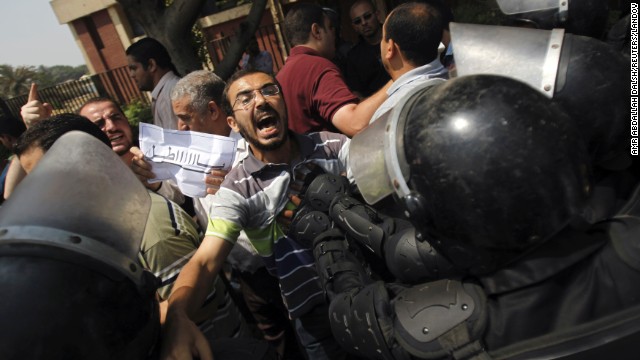 Members of the Muslim Brotherhood and supporters of ousted Egyptian President Mohamed Morsy clash with riot police during the swearing in ceremony of Adly Mansour as interim president in Cairo on Thursday, July 4. Egypt's military deposed Morsy, the country's first democratically elected president, the country's top general announced Wednesday. View photos of Egypt after the coup.
Members of the Muslim Brotherhood and supporters of ousted Egyptian President Mohamed Morsy clash with riot police during the swearing in ceremony of Adly Mansour as interim president in Cairo on Thursday, July 4. Egypt's military deposed Morsy, the country's first democratically elected president, the country's top general announced Wednesday. View photos of Egypt after the coup. 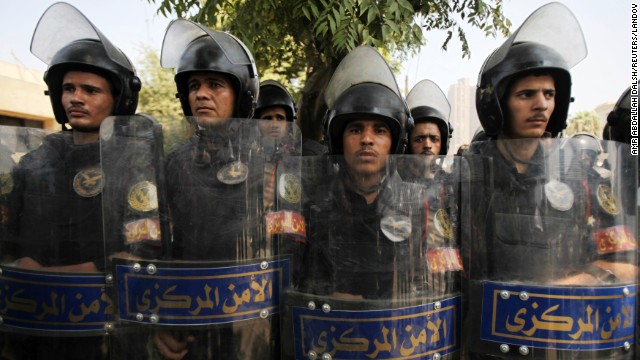 Riot police stand guard as members of the Muslim Brotherhood and supporters of Morsy protest in front of Egypt's Constitutional Court in Cairo on July 4.
Riot police stand guard as members of the Muslim Brotherhood and supporters of Morsy protest in front of Egypt's Constitutional Court in Cairo on July 4. 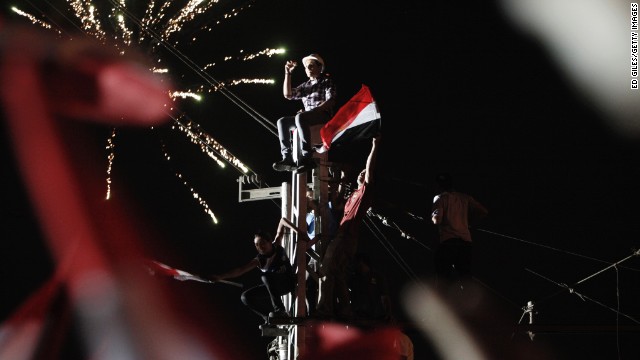 Protesters celebrate outside Egypt's Presidential Palace in Cairo on Wednesday, July 3.
Protesters celebrate outside Egypt's Presidential Palace in Cairo on Wednesday, July 3. 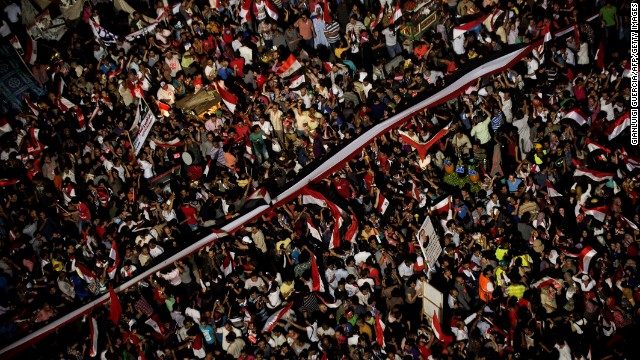 People celebrate at Tahrir Square after a broadcast on July 3 confirming that the Egyptian Army will temporarily be taking over.
People celebrate at Tahrir Square after a broadcast on July 3 confirming that the Egyptian Army will temporarily be taking over. 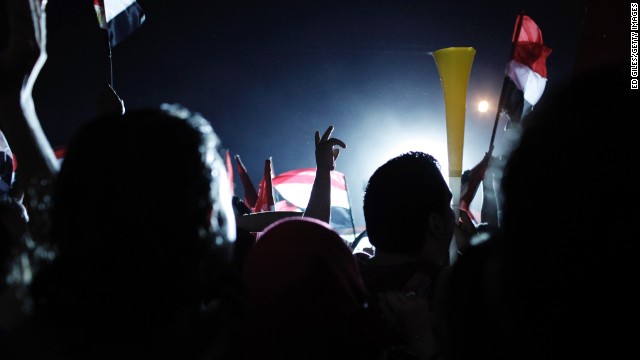 Protesters in Tahrir Square celebrate the news that Morsy was ousted on July 3.
Protesters in Tahrir Square celebrate the news that Morsy was ousted on July 3. 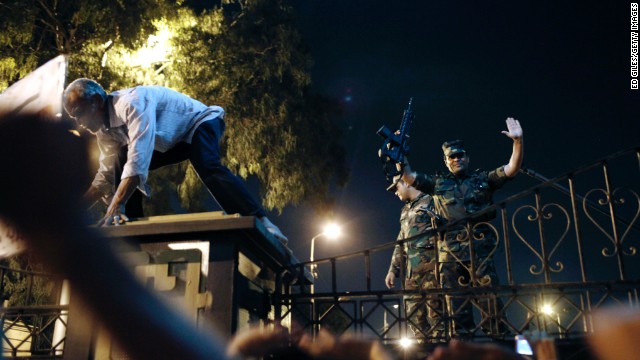 An officer gestures to protesters at the gates of the Republican Guard headquarters in the suburb of Nasr City on July 3. The Egyptian military gave Morsy a 48-hour ultimatum on Monday to accommodate his opponents with a power-sharing agreement or be pushed aside.
An officer gestures to protesters at the gates of the Republican Guard headquarters in the suburb of Nasr City on July 3. The Egyptian military gave Morsy a 48-hour ultimatum on Monday to accommodate his opponents with a power-sharing agreement or be pushed aside. 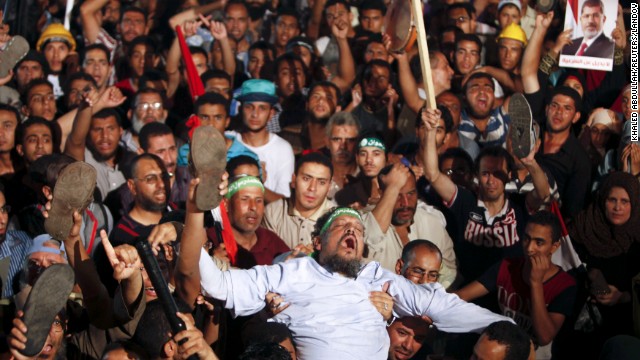 Members of the Muslim Brotherhood and Morsy supporters react at the Raba El-Adwyia mosque square on July 3 after the Egyptian Army's statement was announced on state TV.
Members of the Muslim Brotherhood and Morsy supporters react at the Raba El-Adwyia mosque square on July 3 after the Egyptian Army's statement was announced on state TV. 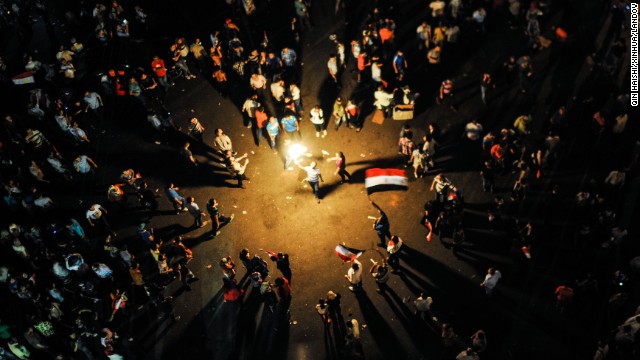 Protesters celebrate near Egypt's Presidential Palace in Cairo on July 3.
Protesters celebrate near Egypt's Presidential Palace in Cairo on July 3. 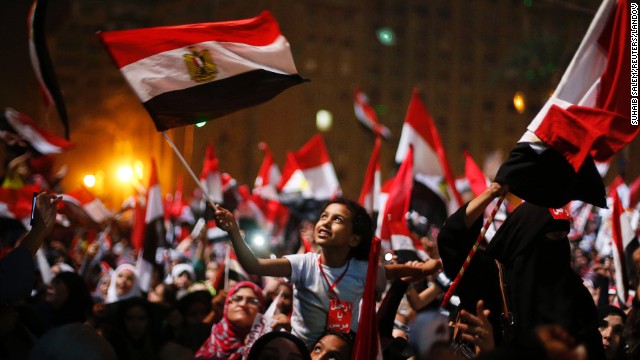 Anti-Morsy protesters wave flags in Tahrir Square on July 3.
Anti-Morsy protesters wave flags in Tahrir Square on July 3. 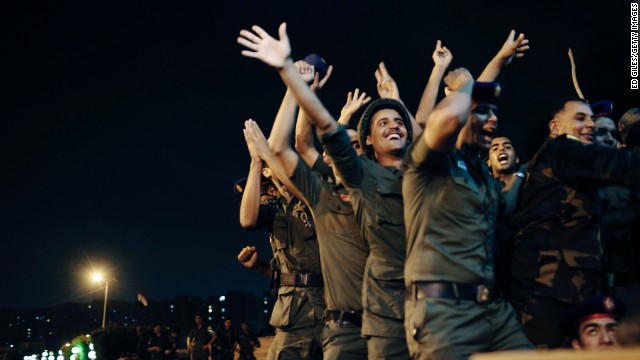 Officers of the Egyptian Republican Guard celebrate at their headquarters in Nasr City on July 3.
Officers of the Egyptian Republican Guard celebrate at their headquarters in Nasr City on July 3. 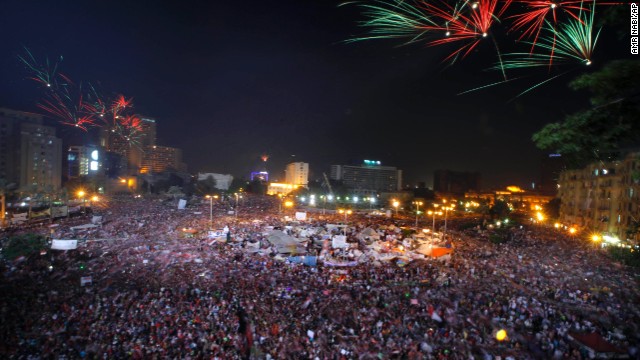 Fireworks light the sky as Morsy opponents celebrate in Tahrir Square on July 3.
Fireworks light the sky as Morsy opponents celebrate in Tahrir Square on July 3. 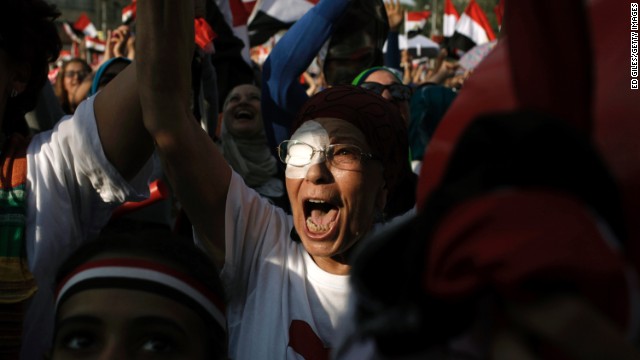 Opposition protesters celebrate outside Egypt's Presidential Palace in Cairo on July 3.
Opposition protesters celebrate outside Egypt's Presidential Palace in Cairo on July 3. 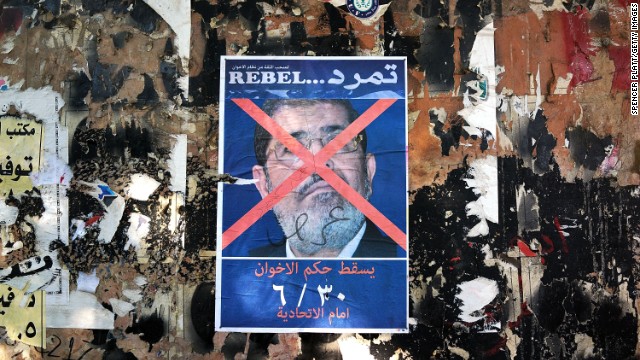 An anti-Morsy poster is displayed on a wall in Tahrir Square on July 3.
An anti-Morsy poster is displayed on a wall in Tahrir Square on July 3. 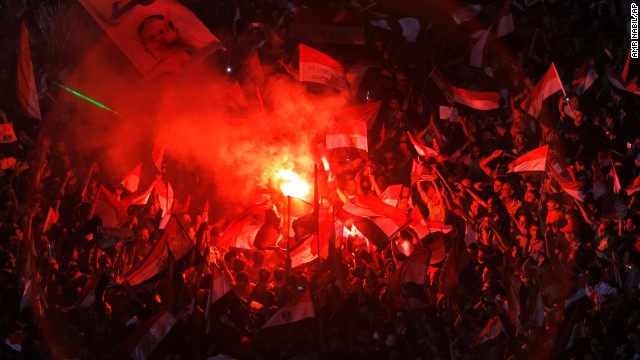 Opposition protesters celebrate on July 3, lighting flares and waving national flags in Tahrir Square.
Opposition protesters celebrate on July 3, lighting flares and waving national flags in Tahrir Square. 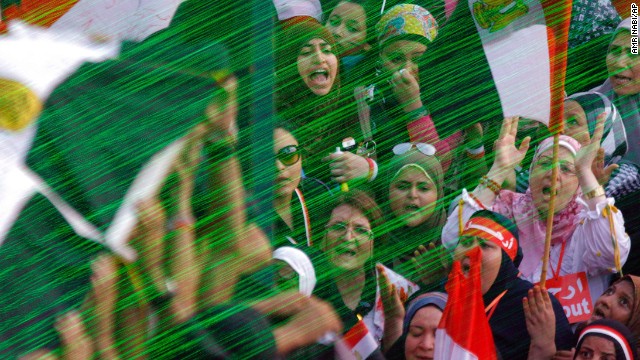 On July 3 in front of a symbolic coffin, green lasers illuminate opposition protesters performing funeral prayers for Egyptians killed during clashes between supporters and opponents of Morsy.
On July 3 in front of a symbolic coffin, green lasers illuminate opposition protesters performing funeral prayers for Egyptians killed during clashes between supporters and opponents of Morsy. 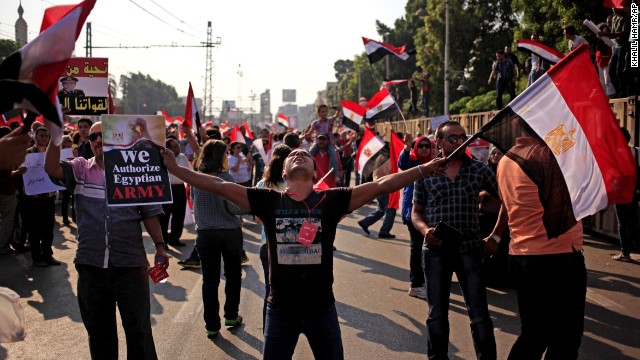 Opponents of Morsy wave national flags during a protest outside the presidential palace in Cairo on July 3.
Opponents of Morsy wave national flags during a protest outside the presidential palace in Cairo on July 3. 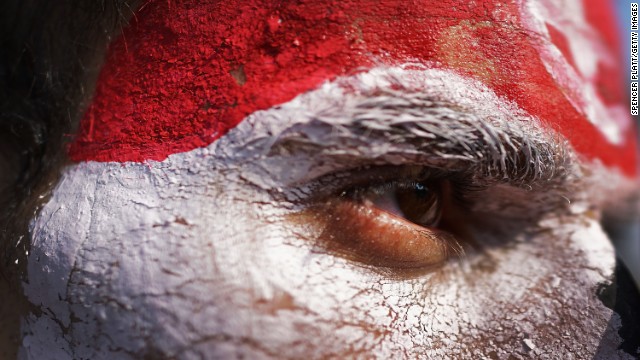 A man with his face painted the colors of the Egyptian flag looks out as thousands of protesters gather on July 3 in Tahrir Square.
A man with his face painted the colors of the Egyptian flag looks out as thousands of protesters gather on July 3 in Tahrir Square. 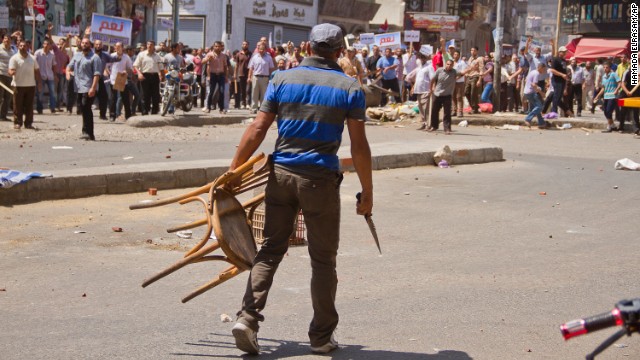 An opposition protester holds a chair and knife during clashes between supporters and opponents of Morsy on July 3 in downtown Damietta, Egypt, which is north of Cairo near the Mediterranean Sea.
An opposition protester holds a chair and knife during clashes between supporters and opponents of Morsy on July 3 in downtown Damietta, Egypt, which is north of Cairo near the Mediterranean Sea. 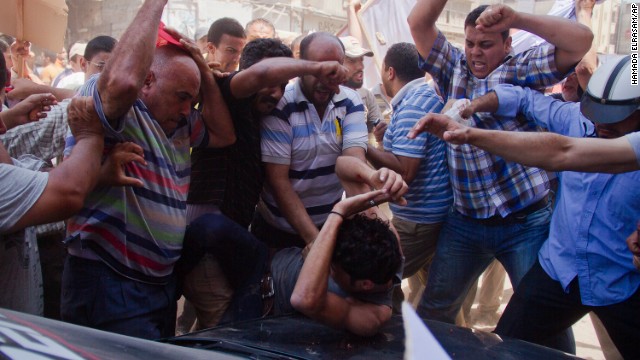 An opposition protester is beaten by pro-Morsy demonstrators during clashes in Damietta on July 3.
An opposition protester is beaten by pro-Morsy demonstrators during clashes in Damietta on July 3. 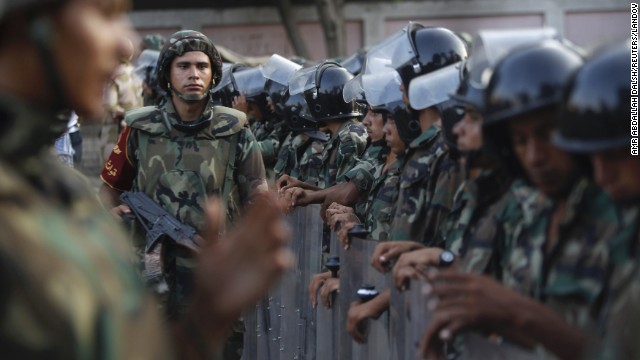 Egyptian Army soldiers take their positions in front of protesters near the Republican Guard headquarters in Cairo on July 3.
Egyptian Army soldiers take their positions in front of protesters near the Republican Guard headquarters in Cairo on July 3. 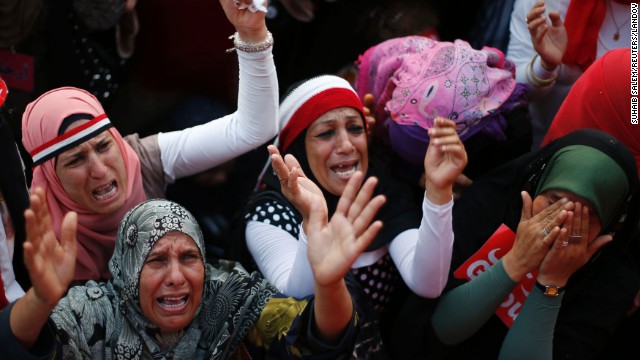 Women react to the flag-draped body of a victim (not pictured) who was killed during fighting outside Cairo University on July 3.
Women react to the flag-draped body of a victim (not pictured) who was killed during fighting outside Cairo University on July 3. 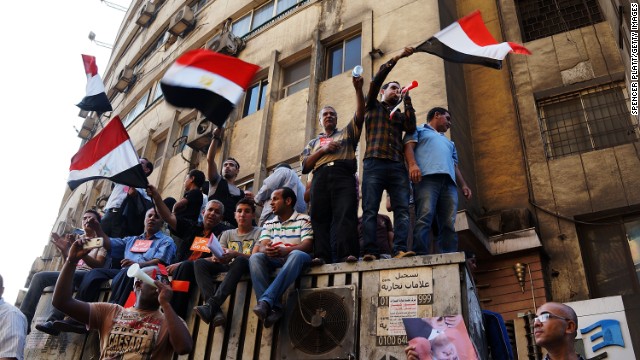 Thousands of Egyptian protesters celebrate in Tahrir Square as the deadline given by the military to Morsy passes on July 3.
Thousands of Egyptian protesters celebrate in Tahrir Square as the deadline given by the military to Morsy passes on July 3. 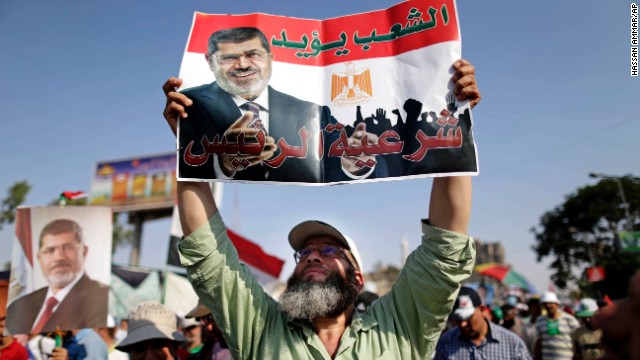 A supporter of Morsy holds a poster that reads, "The people support legitimacy for the president," during a rally in Cairo on July 3.
A supporter of Morsy holds a poster that reads, "The people support legitimacy for the president," during a rally in Cairo on July 3. 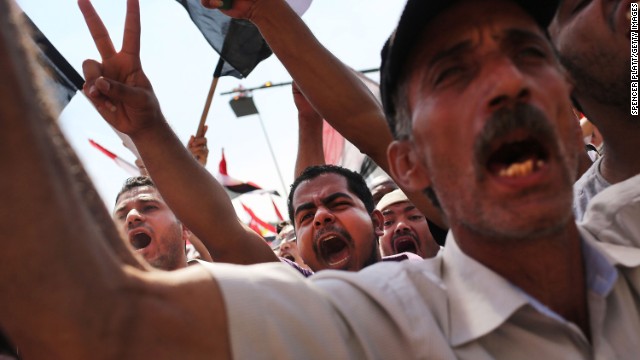 Thousands of protesters gather in Tahrir Square in Cairo on July 3.
Thousands of protesters gather in Tahrir Square in Cairo on July 3. 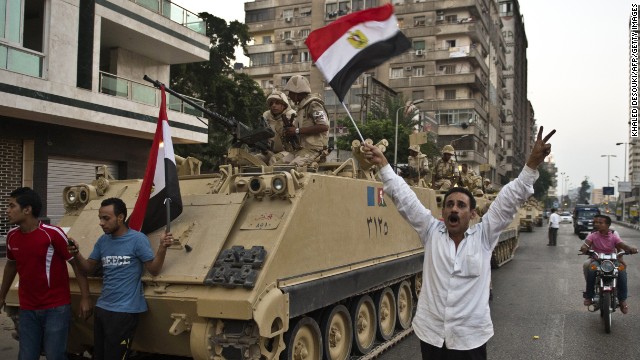 Egyptians salute Army tanks upon their deployment on a street leading to Cairo University on July 3.
Egyptians salute Army tanks upon their deployment on a street leading to Cairo University on July 3. 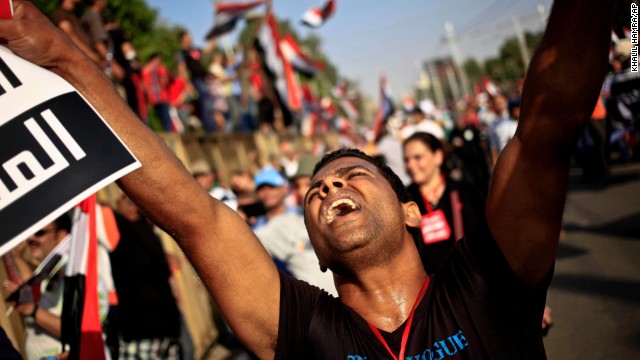 An opponent of Morsy chants slogans during a protest outside the presidential palace in Cairo on July 3.
An opponent of Morsy chants slogans during a protest outside the presidential palace in Cairo on July 3. 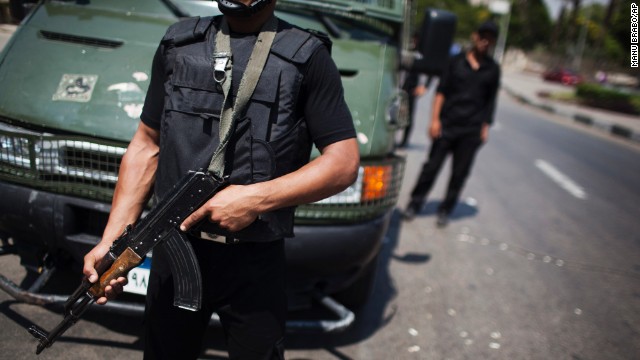 Egyptian special forces police stand guard beside an armored vehicle, protecting a bridge connecting Cairo and Giza, Egypt, where Muslim Brotherhood supporters have gathered, on July 3.
Egyptian special forces police stand guard beside an armored vehicle, protecting a bridge connecting Cairo and Giza, Egypt, where Muslim Brotherhood supporters have gathered, on July 3. 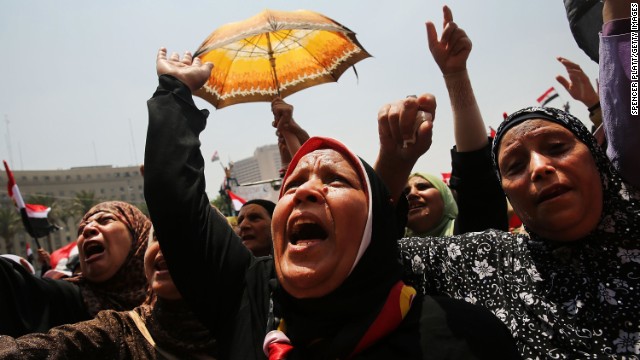 Hundreds of protesters gather in Tahrir Square in Cairo as the deadline given to Morsy by the military approaches on July 3.
Hundreds of protesters gather in Tahrir Square in Cairo as the deadline given to Morsy by the military approaches on July 3. 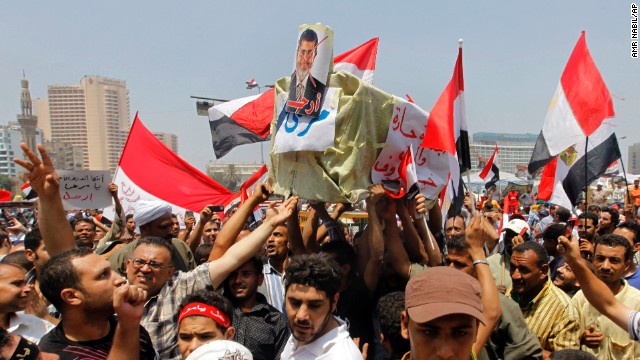 Opponents of Morsy shout slogans as they carry a symbolic coffin during a protest in Tahrir Square on July 3.
Opponents of Morsy shout slogans as they carry a symbolic coffin during a protest in Tahrir Square on July 3. 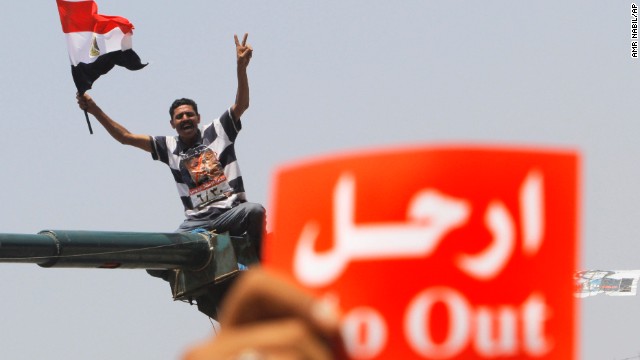 A protester shouts during a demonstration in Tahrir Square on July 3.
A protester shouts during a demonstration in Tahrir Square on July 3. 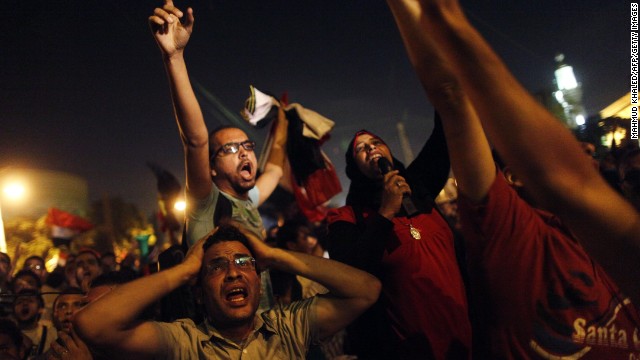 Protesters react after Morsy's speech in a street leading to the presidential palace in Cairo early on July 3. Morsy's angry opponents met head-on overnight with his supporters at Cairo University, leaving 23 people dead.
Protesters react after Morsy's speech in a street leading to the presidential palace in Cairo early on July 3. Morsy's angry opponents met head-on overnight with his supporters at Cairo University, leaving 23 people dead. 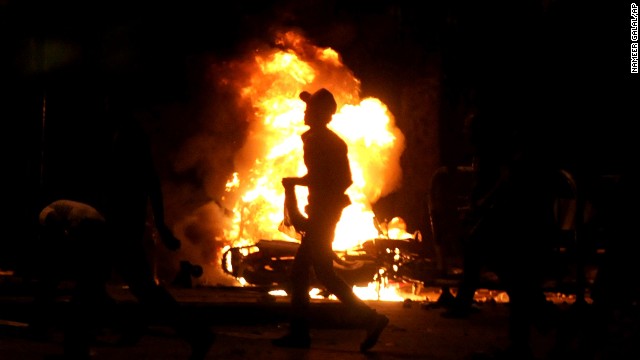 A protester runs past a fire raging during clashes in Giza, Egypt, early on July 3.
A protester runs past a fire raging during clashes in Giza, Egypt, early on July 3. 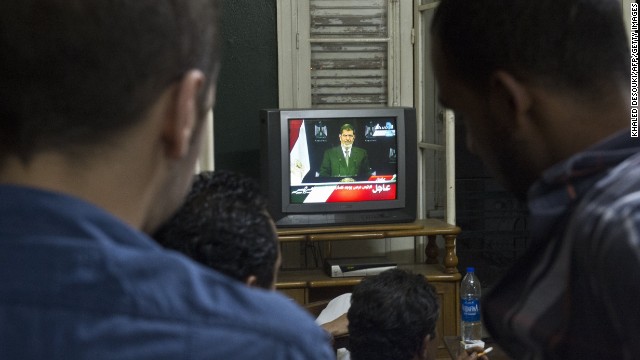 People watch Morsy on television in Cairo on Tuesday, July 2.
People watch Morsy on television in Cairo on Tuesday, July 2. 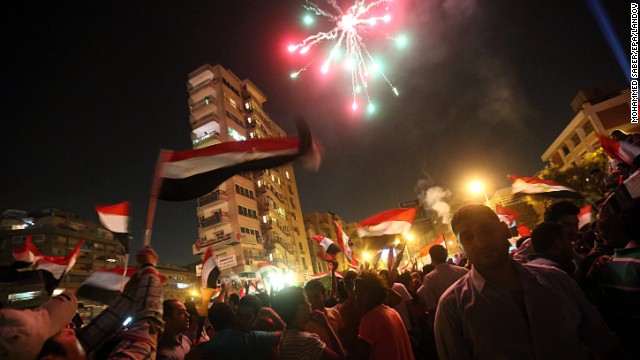 Fireworks go off as protesters gather in the streets outside the presidential palace in Cairo on July 2.
Fireworks go off as protesters gather in the streets outside the presidential palace in Cairo on July 2. 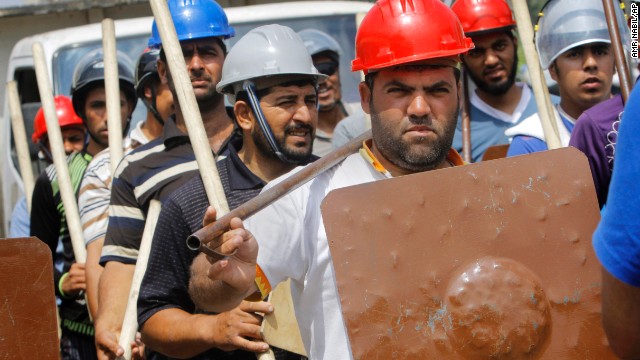 Supporters of President Morsy hold sticks and wear protective gear during training outside a mosque in Cairo on July 2.
Supporters of President Morsy hold sticks and wear protective gear during training outside a mosque in Cairo on July 2. 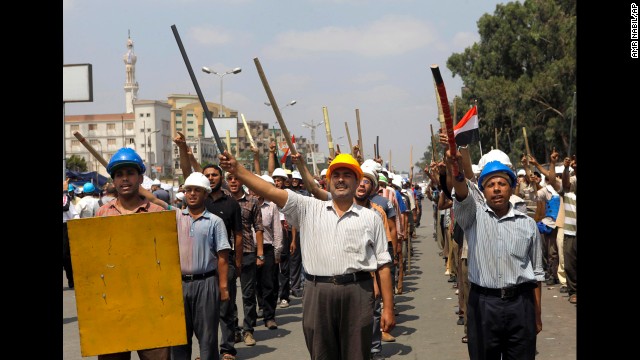 Morsy supporters march in formation in Cairo on July 2.
Morsy supporters march in formation in Cairo on July 2. 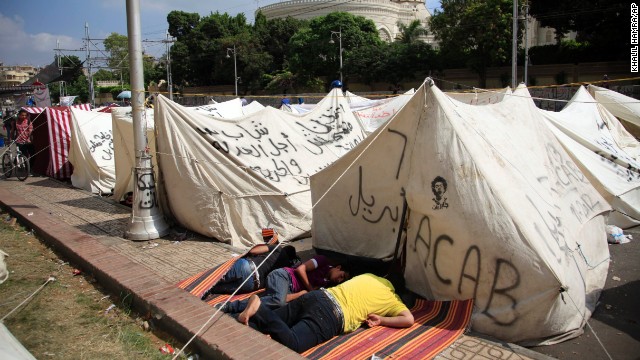 Opponents of Morsy camp out as they protest outside the presidential palace in Cairo on July 2.
Opponents of Morsy camp out as they protest outside the presidential palace in Cairo on July 2. 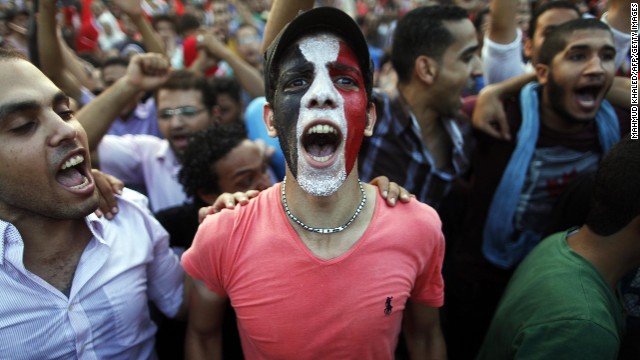 Egyptians shout slogans against Morsy in Cairo on Monday, July 1.
Egyptians shout slogans against Morsy in Cairo on Monday, July 1. 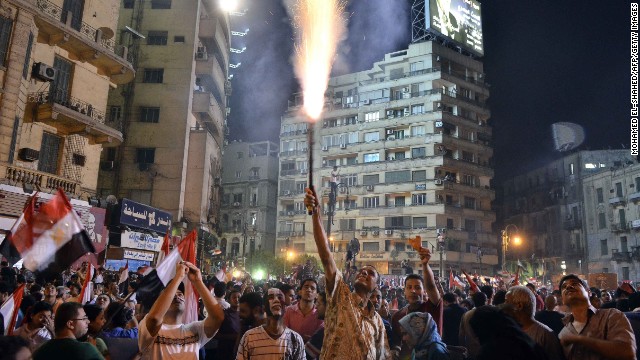 A protester lights a flare as hundreds of thousands of demonstrators gather in Cairo's landmark Tahrir Square on July 1 during a protest calling for the ouster of Morsy.
A protester lights a flare as hundreds of thousands of demonstrators gather in Cairo's landmark Tahrir Square on July 1 during a protest calling for the ouster of Morsy. 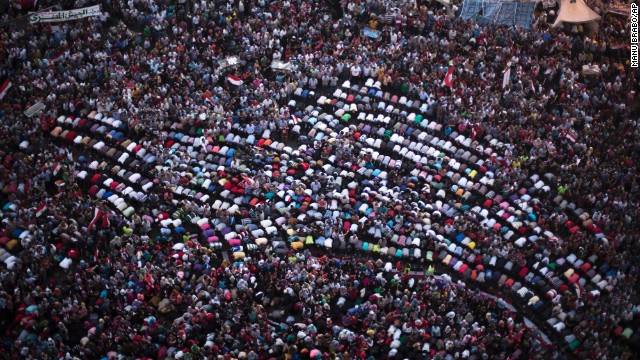 Protesters pray during a demonstration against Morsy in Cairo's Tahrir Square on Monday, July 1. Pro- and anti-government demonstrations have spread around the country surrounding the one-year mark of Morsy coming into office on Sunday, June 30.
Protesters pray during a demonstration against Morsy in Cairo's Tahrir Square on Monday, July 1. Pro- and anti-government demonstrations have spread around the country surrounding the one-year mark of Morsy coming into office on Sunday, June 30. 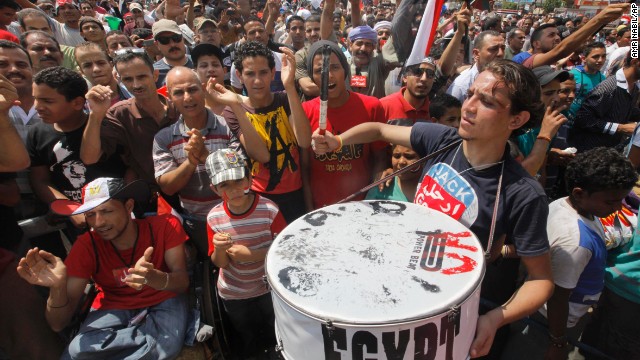 Egyptian protesters shout slogans and wave national flags during a demonstration against President Mohamed Morsy in Tahrir Square in Cairo on July 1.
Egyptian protesters shout slogans and wave national flags during a demonstration against President Mohamed Morsy in Tahrir Square in Cairo on July 1. 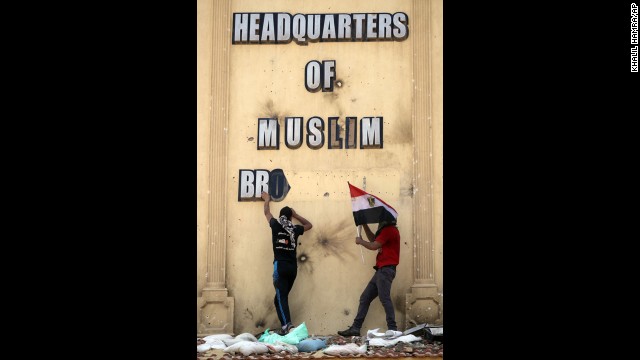 Egyptian protesters ransack the Muslim Brotherhood headquarters in the Muqatam district in Cairo on July 1. Protesters stormed and ransacked the headquarters of Morsy's Muslim Brotherhood group early Monday.
Egyptian protesters ransack the Muslim Brotherhood headquarters in the Muqatam district in Cairo on July 1. Protesters stormed and ransacked the headquarters of Morsy's Muslim Brotherhood group early Monday. 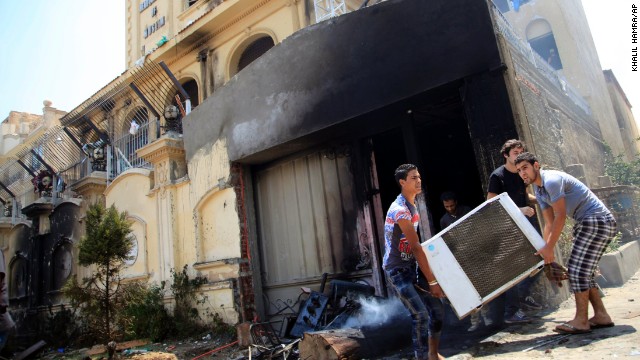 Egyptian protesters ransack the Muslim Brotherhood headquarters in Cairo on July 1.
Egyptian protesters ransack the Muslim Brotherhood headquarters in Cairo on July 1. 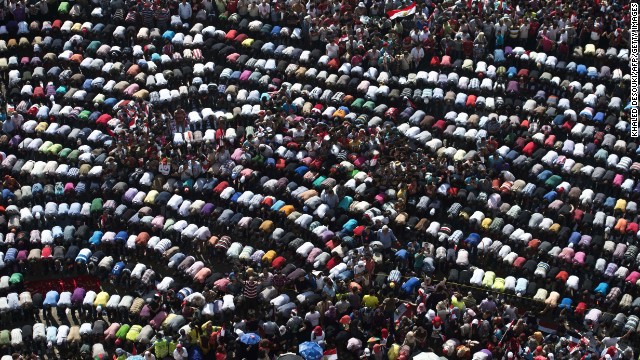 Thousands of opponents of Egyptian President Morsy pray during a protest calling for his ouster on Sunday, June 30. On the first anniversary of his inauguration, Morsy's Islamist supporters vow to defend his legitimacy to the end.
Thousands of opponents of Egyptian President Morsy pray during a protest calling for his ouster on Sunday, June 30. On the first anniversary of his inauguration, Morsy's Islamist supporters vow to defend his legitimacy to the end. 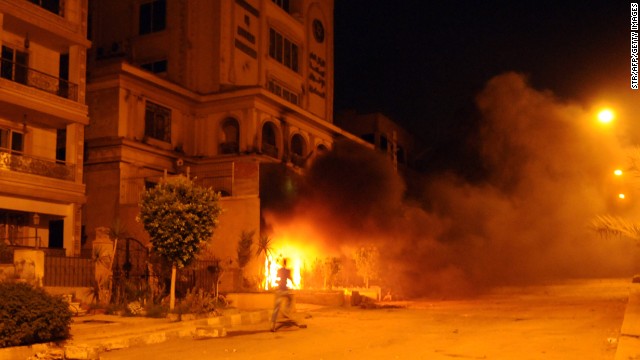 Protesters stormed the main headquarters of the Muslim Brotherhood in Cairo, the party that Morsy led before his election, and set it on fire on June 30.
Protesters stormed the main headquarters of the Muslim Brotherhood in Cairo, the party that Morsy led before his election, and set it on fire on June 30. 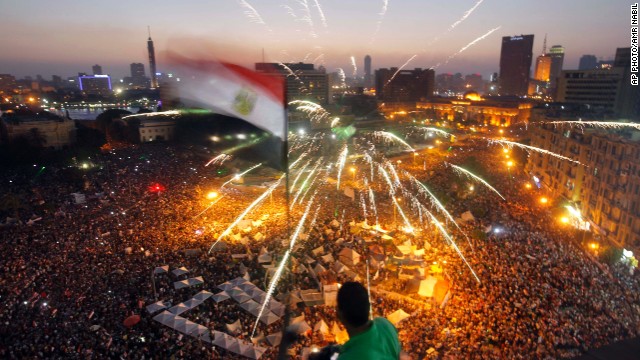 Morsy's opponents say his policies are to blame for a breakdown in law and order, for an economy that's gone south, and for a gas shortage that has Egyptians waiting at the pumps for hours. Here, protestors fill the streets of Cairo on June 30.
Morsy's opponents say his policies are to blame for a breakdown in law and order, for an economy that's gone south, and for a gas shortage that has Egyptians waiting at the pumps for hours. Here, protestors fill the streets of Cairo on June 30. 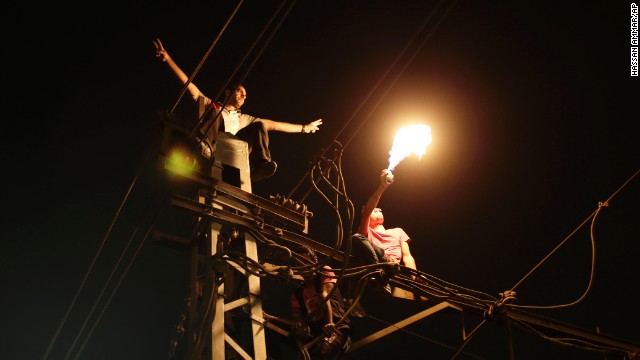 Protesters sit on top of a power pole as they chant slogans against Morsy outside the presidential palace in Cairo on June 30. "Egypt is on the brink of a volcano," government-run newspaper Al-Akhbar said.
Protesters sit on top of a power pole as they chant slogans against Morsy outside the presidential palace in Cairo on June 30. "Egypt is on the brink of a volcano," government-run newspaper Al-Akhbar said. 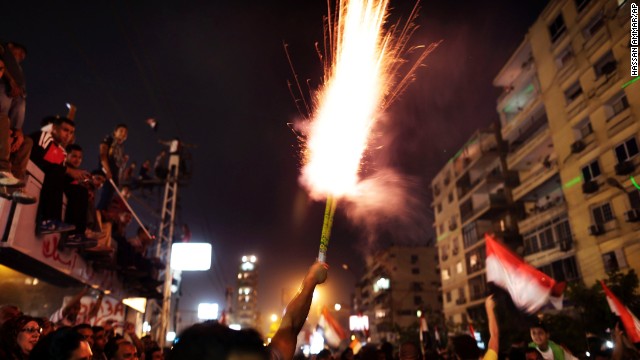 Protesters set off fireworks on June 30 outside the presidential palace.
Protesters set off fireworks on June 30 outside the presidential palace. 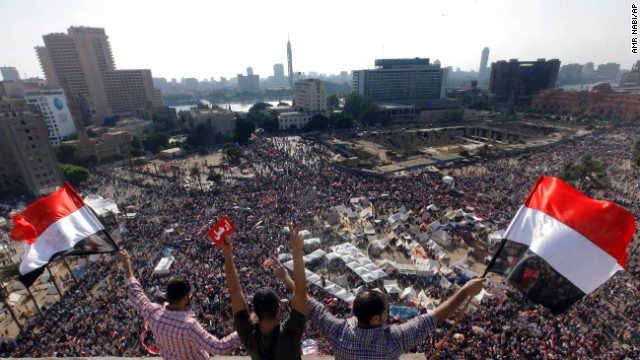 Protesters wave national flags and a red card in Arabic reading "leave" in Tahrir Square during the June 30 demonstrations against Morsy.
Protesters wave national flags and a red card in Arabic reading "leave" in Tahrir Square during the June 30 demonstrations against Morsy. 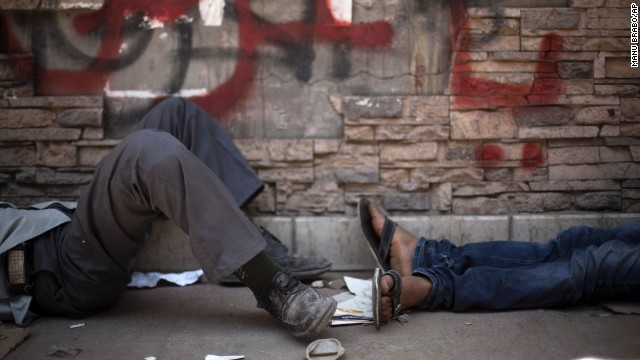 Protesters take a rest near Tahrir Square on June 30.
Protesters take a rest near Tahrir Square on June 30. 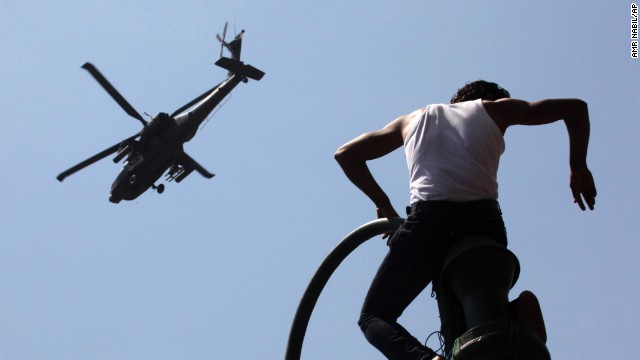 A protester watches an Apache helicopter as it flies over Tahrir Square on June 30. Morsy's opponents stood their ground in the square, where protests two years ago helped topple Hosni Mubarak's 29-year rule.
A protester watches an Apache helicopter as it flies over Tahrir Square on June 30. Morsy's opponents stood their ground in the square, where protests two years ago helped topple Hosni Mubarak's 29-year rule. 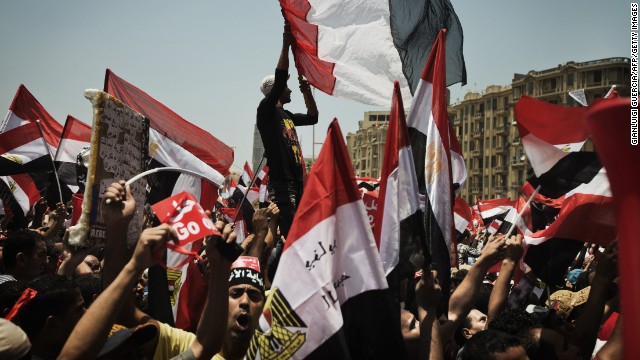 The demonstrators say they collected 17 million signatures -- roughly 4 million more than what won Morsy the presidency -- and all of them call for Morsy to go.
The demonstrators say they collected 17 million signatures -- roughly 4 million more than what won Morsy the presidency -- and all of them call for Morsy to go. 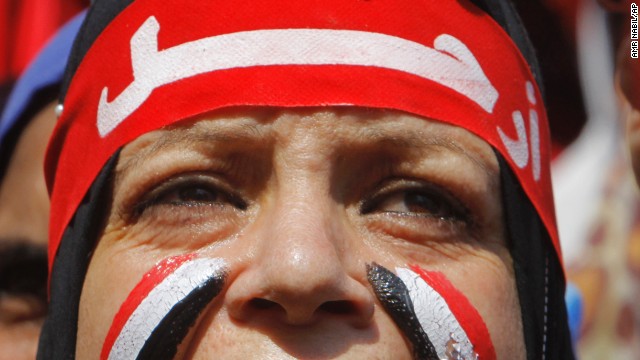 An Egyptian protester chants slogans during the June 30 rally.
An Egyptian protester chants slogans during the June 30 rally. 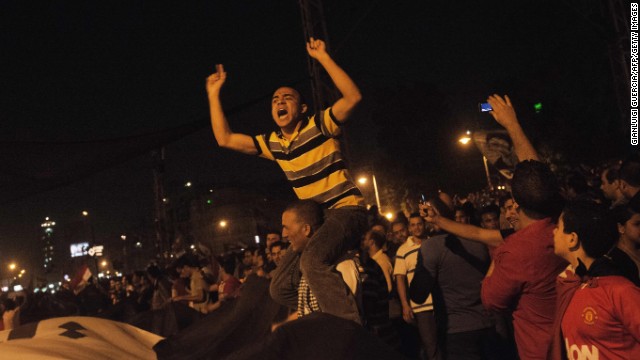 Hundreds of thousands of Morsy opponents chant outside the presidential palace on June 30.
Hundreds of thousands of Morsy opponents chant outside the presidential palace on June 30. 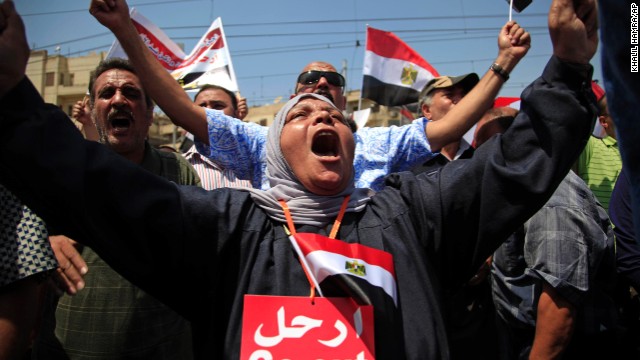 Morsy opponents protest outside the presidential palace in Cairo on June 30.
Morsy opponents protest outside the presidential palace in Cairo on June 30. 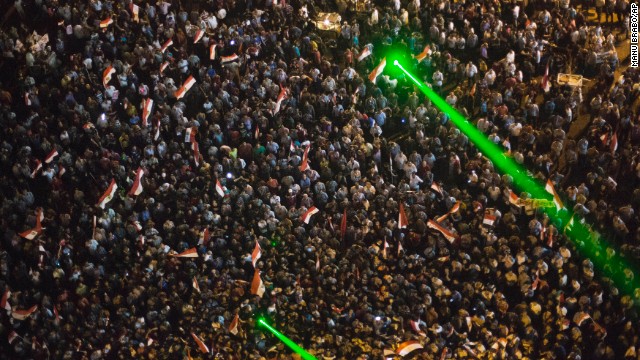 Thousands of Egyptian protesters gather in Tahrir Square on June 30.
Thousands of Egyptian protesters gather in Tahrir Square on June 30. 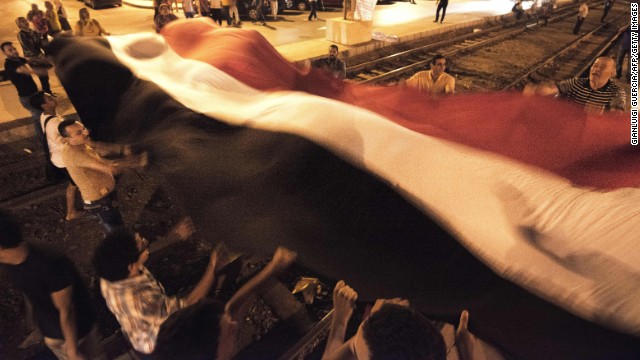 Morsy opponents wave a giant national flag outside the presidential palace on Saturday, June 29.
Morsy opponents wave a giant national flag outside the presidential palace on Saturday, June 29. 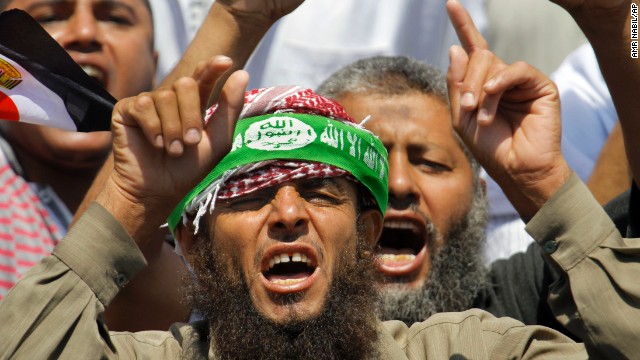 Supporters of the president shout slogans at the opposition near a mosque in Cairo on June 29. "We're not leaving, and the president is staying," one supporter told CNN. "We believe in democracy. If people don't like him, they can vote him out in three years."
Supporters of the president shout slogans at the opposition near a mosque in Cairo on June 29. "We're not leaving, and the president is staying," one supporter told CNN. "We believe in democracy. If people don't like him, they can vote him out in three years." 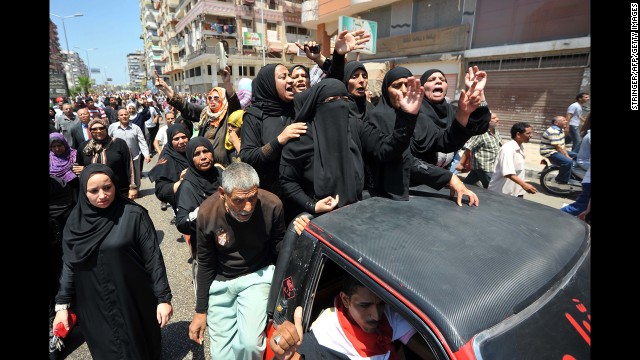 Mourners shout slogans during journalist Salah Hassan's funeral on June 29 in Port Said.
Mourners shout slogans during journalist Salah Hassan's funeral on June 29 in Port Said. 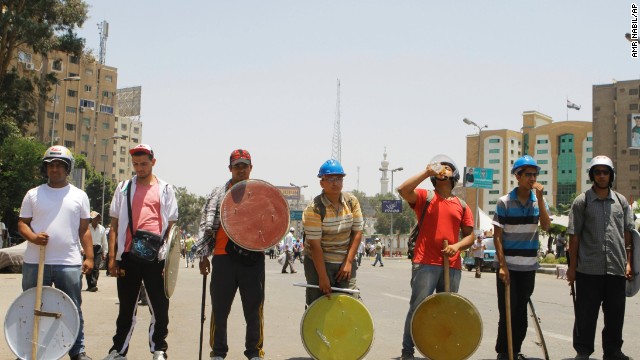 Morsy supporters, armed with sticks and shields, stand guard at their protest site in Cairo on June 29.
Morsy supporters, armed with sticks and shields, stand guard at their protest site in Cairo on June 29. 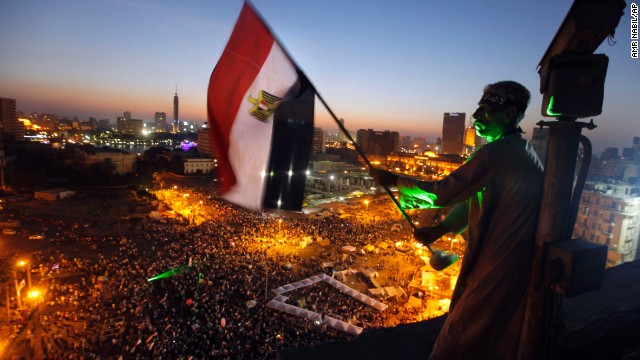 A protester waves a national flag over Tahrir Square on Friday, June 28.
A protester waves a national flag over Tahrir Square on Friday, June 28. 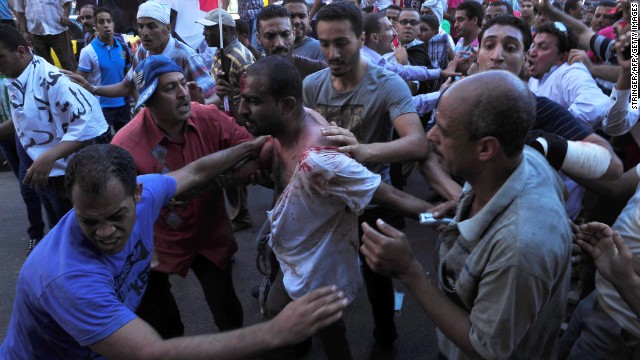 Egyptians help a wounded man following clashes between Morsy's supporters and opponents in Alexandria on June 28.
Egyptians help a wounded man following clashes between Morsy's supporters and opponents in Alexandria on June 28. 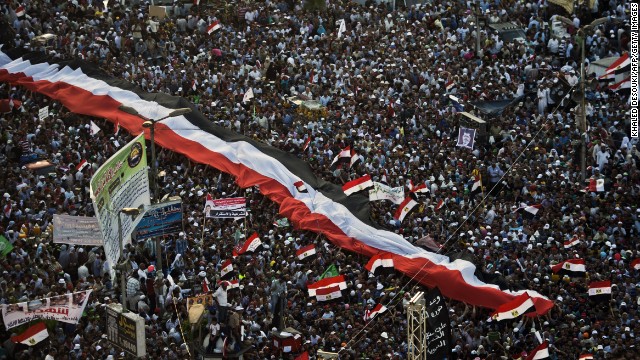 Morsy supporters demonstrate in Cairo on June 28. Protests also erupted in Suez, Sharqia, El Monofia and Gharbiya, the state-run Ahram news agency said. And in the port city of Alexandria, so many people turned out that traffic virtually came to a standstill.
Morsy supporters demonstrate in Cairo on June 28. Protests also erupted in Suez, Sharqia, El Monofia and Gharbiya, the state-run Ahram news agency said. And in the port city of Alexandria, so many people turned out that traffic virtually came to a standstill. 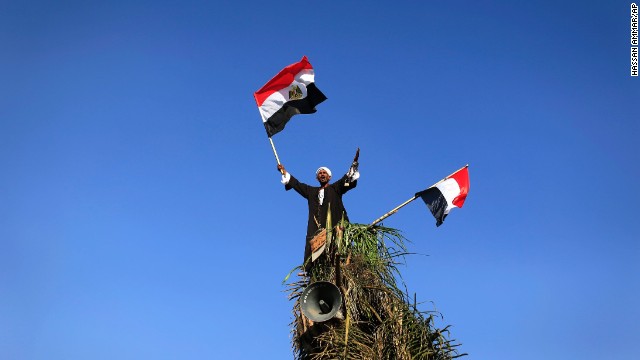 A Morsy opponent waves Egyptian flags during a protest outside the Egyptian Defense Ministry in Cairo on June 28.
A Morsy opponent waves Egyptian flags during a protest outside the Egyptian Defense Ministry in Cairo on June 28. 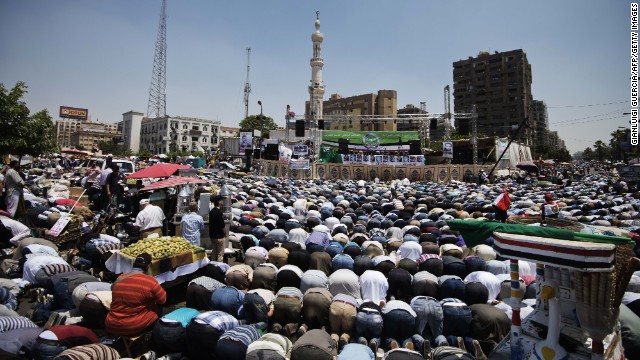 Thousands of Muslim Brotherhood supporters conduct Friday prayers in front of a Cairo mosque before the start of a sit-in for Morsy on June 28.
Thousands of Muslim Brotherhood supporters conduct Friday prayers in front of a Cairo mosque before the start of a sit-in for Morsy on June 28. 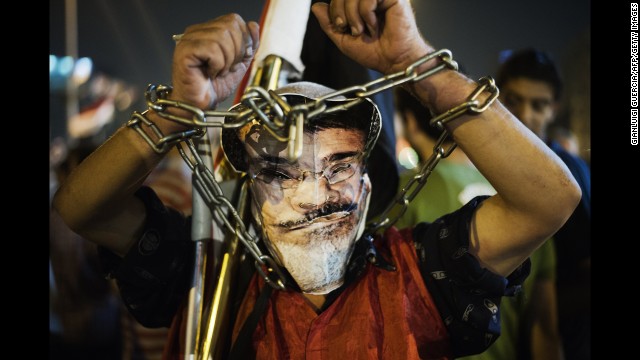 A chained protester wearing a picture of Morsy participates in an anti-government protest in Tahrir Square on Wednesday, June 26.
A chained protester wearing a picture of Morsy participates in an anti-government protest in Tahrir Square on Wednesday, June 26. 
1

2

3

4

5

6

7

8

9

10

11

12

13

14

15

16

17

18

19

20

21

22

23

24

25

26

27

28

29

30

31

32

33

34

35

36

37

38

39

40

41

42

43

44

45

46

47

48

49

50

51

52

53

54

55

56

57

58

59

60

61

62

63

64

65

66
- Frida Ghitis: The Arab uprisings gave the U.S. a historic chance to side with freedom
- Ghitis: Incredibly, the Obama administration's response has been marked by timidity
- She says in pursuit of stability, the U.S. held its tongue as Egypt's leader broke his words
- Ghitis: U.S. should side more with those who share its ideals and help them in revolutions
Editor's note: Frida Ghitis is a world affairs columnist for The Miami Herald and World Politics Review. A former CNN producer and correspondent, she is the author of "The End of Revolution: A Changing World in the Age of Live Television." Follow her on Twitter: @FridaGColumns.
(CNN) -- The 2011 Arab uprisings presented the United States with a historic opportunity to take a clear stand on the side of freedom and democracy and strengthen its own standing in the process. Incredibly, the Obama administration has blundered and stumbled, with a response marked by timidity and caution.
As a result, America appears weaker, less influential and less trusted, while the Arab Middle East continues to seethe with instability and violence.
Today, as the Egyptian state shudders, with millions taking to the streets infuriated with a government that is taking the country down a path they do not trust, and as Syrians continue to slaughter each other, with death toll approaching 100,000, there is no side in the conflicts that feels warmly toward America.

The most astonishing part is that the uprisings across the Middle East and North Africa were launched by young, progressive idealists, whose objective was to reshape their countries by overthrowing entrenched dictators and bringing pluralism and democracy.
The DNA of the revolution made it a natural for American support.
Granted, the uprisings also targeted strong American allies, such as Egypt's now-deposed president, Hosni Mubarak. But once the dictator fell, America should have made a much stronger case for the fundamental principles of liberal democracy.
It is extraordinary this is happening under Obama, the leader who took the dramatic step of traveling to Cairo just months into his first term and delivering a landmark speech that vowed to end the "cycle of suspicion and discord" between Americans and Muslims, and affirmed his belief that all people "yearn for certain things," including freedom, democracy, and genuine justice.
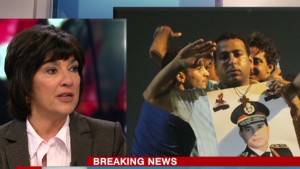 Morsy overthrown by Egypt's military
Morsy overthrown by Egypt's military 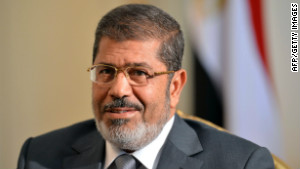 Egypt begins post-Morsy era
Egypt begins post-Morsy era 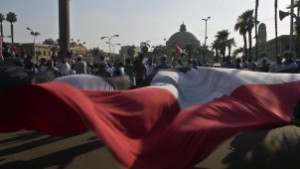 Pro-Morsy crowd: Down with military rule
Pro-Morsy crowd: Down with military rule When the people took the reins of history into their own hands, Obama's poetry crashed into geopolitical realities, not to mention domestic political considerations.
The choices, in fairness, were not easy. But Obama could have done much better.
Coup worsens Obama's Egypt policy headache
In Egypt, the Muslim Brotherhood, a group with a deeply anti-Western, anti-American ideology, won the elections. Washington was right in trying to work with a government that had been elected by the Egyptian people. But it went too far, ignoring the fundamental principles of democracy that America should have kept at the forefront of the agenda.
Washington had to work with Cairo -- and hence, with the government of President Mohammed Morsy -- but it didn't have to keep as quiet as it did when Morsy and his supporters started pushing away from democratic principles, undermining freedoms and laying the groundwork for a state that would change the character of the country. The pan-Islamist vision of the Brotherhood is deeply offensive to supporters of equality for women, legal protections for minorities, free media, and respect for the views of the opposition.
Instead, in pursuit of stability, the U.S. held its tongue. Occasionally, American officials spoke out, as when the ambassador to Egypt, Anne Patterson, told a small group in Alexandria that "democracy needs a healthy and active civil society."
But when the government went after that same civil society, arresting and then convicting 43 members of nongovernmental organizations -- including 16 Americans -- and sentencing them to prison terms on sham charges, the U.S. kept its voice low, to the dismay of its friends.
The Obama administration has been so timid, so eager to stay out of the fray, that a few weeks before the verdict against the pro-democracy activists, Secretary of State John Kerry passed up the opportunity to take a stand for the workers, and for democracy, by quietly waiving the human rights preconditions of U.S. aid to Egypt and thus allowing $1.3 billion in aid to go forward.
There were better ways to play that hand. America threw away its aces.
In Syria, the U.S. passed up for too long the opportunity to support the most liberal of rebels fighting against the dictator Bashar al-Assad, allowing extremist radicals to dominate the opposition. Now the choices are far more difficult, and America's standing is in tatters with the people who should have been its natural allies.
The oversimplified equation says the country has to choose between its ideals and its interests. But in the case of the Arab uprisings, America's ideals and interests overlap. If Washington stood more convincingly with those who share its ideals, it would strengthen them within their revolutions. It would help them to victory, and then America would become stronger, having real friends in power in the post-revolutionary Middle East.
It's not too late for a course correction.
Follow us on Twitter @CNNOpinion.
Join us on Facebook/CNNOpinion.
The opinions expressed in this commentary are solely those of Frida Ghitis.







